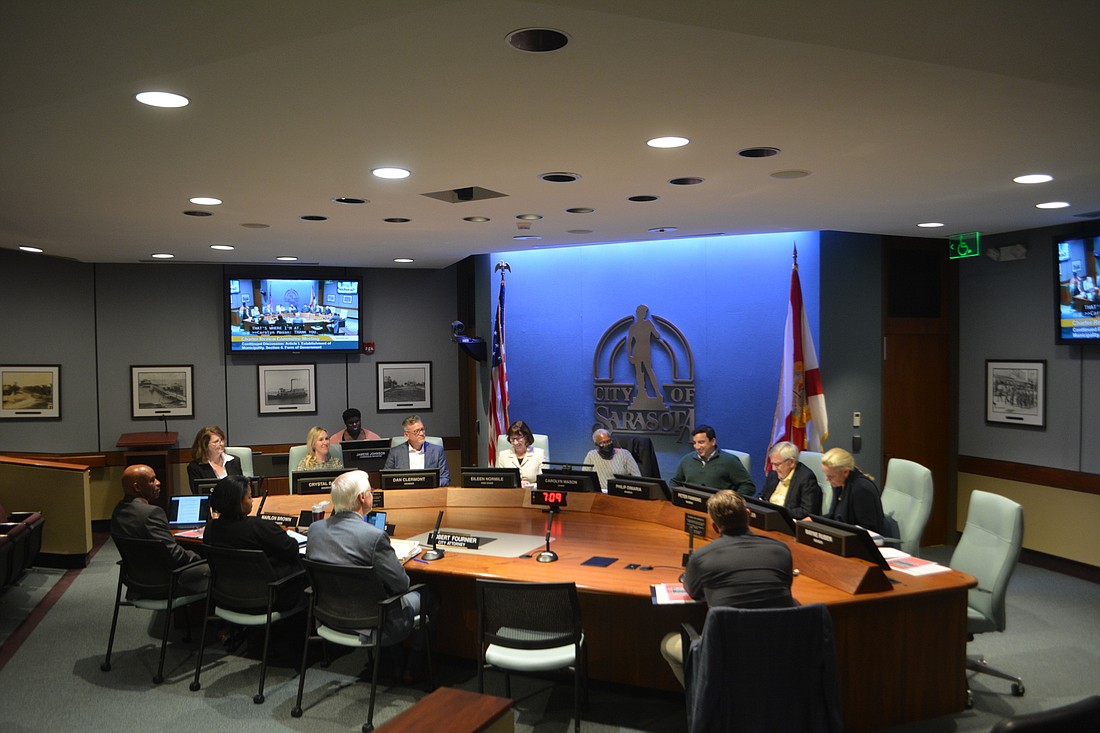- December 23, 2024
-
-
Loading

Loading

The Charter Review Committee endorsed a major change to city government Tuesday, recommending the creation of an elected mayor position with executive power distinct from the legislative City Commission.
The advisory board did not come to a decision regarding many of its preferences for a restructured government, vowing to revisit the topic at its next meeting later this month. Already, the group has taken the first step toward a referendum on the question of amending the city charter to establish a “strong mayor.”
The Charter Review Committee, composed of 10 members whom the City Commission appointed, voted 6-3 in favor of an elected mayor. Although some committee members expressed a preference for maintaining the council-manager form of government, a majority said they believed a singular elected leader with more centralized power would prove beneficial for the city.
“I do feel as if we are in a little bit of a crisis when it comes to leadership,” committee member Philip DiMaria said.
Even some Charter Review Committee members who favored an elected mayor said it was unclear whether Sarasota voters felt the same way.
The committee held off on discussing the details of an elected mayor until later this month, holding off for the return of some seasonal residents in hopes of gathering more public input. But Tuesday’s meeting was sparsely attended, with just five residents speaking for or against an overhaul to city government.
“We are really struggling with this as if it’s a life or death situation, when it’s not even as important as tennis courts, based on the audience,” committee member Peter Fanning said.
Between 1996 and 2009, city voters rejected three separate referendums seeking to create an elected mayor position with varying levels of power. Committee members who favored the current council-manager system cited that past opposition and said they did not believe there was a compelling reason to significantly adjust the city’s current system of governance.
“I don’t see the need for change,” committee member Cathy Antunes said. “I don’t see the people clamoring for change.”
Opponents of an elected mayor — particularly one that wielded significant power — also raised concerns about what would happen if a mayor did not conduct himself properly in the leadership position. Committee member Eileen Normile expressed skepticism about the city’s ability to attract qualified candidates in a mayoral race and about the ability of the electoral process to filter out substandard candidates without any conditions on who could run.
“Vision doesn’t do it for me,” Normile said. “Division of power, to me, is a safeguard I wouldn’t want to give up.”
Some elected mayor supporters took issue with that line of thinking, arguing that minimizing the risk associated with a potential bad actor should not be a leading consideration in structuring city government.
“I don’t think working from fear is the right approach,” committee member Kim Githler said.
Those who advocated for an elected mayor said they saw upside in moving away from a form of government in which five commissioners wielded equal power. Committee members suggested an elected mayor would be able to take action more swiftly and serve as the unquestioned point person for major issues facing the city. Committee member Dan Clermont said he envisioned an elected mayor as someone who would lay out a singular vision for the future of Sarasota.
“Without vision, you do tend to just be stewards of the city,” Clermont said. “You don’t provide leadership.”
The committee sorted out a few details about its vision for an elected mayor at Tuesday’s meeting. It recommended a mayor that does not have a voting position on the City Commission, which would continue to serve as a legislative body. It said the mayor should not have veto power over the commission.
The committee also turned away some efforts to limit the power of an elected mayor, voting against proposals to make the mayor a two-year term and to retain the City Commission’s authority to appoint a city manager.
Still, the full scope of a potential elected mayor position — and associated changes with other leadership positions in city government — remain unsettled. The committee intends to finish its work beginning at its next meeting later this month. What would the term of an elected mayor be? What positions would that person oversee? Will there continue to be a professional administrator in the city, and if so, what title would be associated with that role?
Regardless of what the committee cobbles together, its work will ultimately serve as a recommendation to the City Commission. The commission is scheduled to hear a presentation from the committee in March, at which point the city’s elected leaders will have the authority to decide whether to place charter amendments on the ballot for voters to consider.